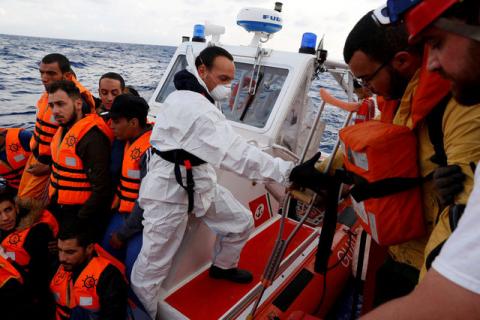Advertisement
Libyans flee by boat amid 'terrible' violence at home
ABOARD SEEFUCHS RESCUE SHIP (Reuters) - Just before the sun dipped into the Mediterranean on Saturday, rescuers spotted a tiny wooden boat on the horizon. It turned out to contain five young Libyans fleeing violence and turmoil who were waving their arms for help.
The crew of the Seefuchs plucked them from the old fishing boat, gave them water and couscous and one of the men, 26-year-old Hamza Tekbali, explained why they had fled their country.
"Libya is terrible," Tekbali told Reuters as he waited to be transferred to an Italian coast guard vessel. "In Libya, if you do not kill, they will kill you," he said, adding that he feared he would be sent straight back home.
The Seefuchs, a ship operated by the humanitarian group Sea-Eye, carried the men to Catania, Italy, on Wednesday along with 16 other Libyans picked up on Sunday.
Already this year some 800 Libyans have reached Italy by sea, more than double the number for the whole of 2016, according to data collected by the U.N. refugee agency (UNHCR).
The number is a fraction of the more than 100,000 non-Libyan migrants who have come to Italy from the country since January, but it suggests that the situation is deteriorating for Libyans in their own country.
Migrants traveling through Libya from elsewhere in Africa en route to Europe already face terrible conditions.
"For the past few months we have seen more Libyans," said Marco Rotunno, who monitors migrant arrivals for UNHCR in Sicily. "They mostly point to a lack of security as their reason for leaving. They talk about fighting, kidnappings, ransom and armed robberies."
Conditions in Libya have deteriorated sharply since a 2011 uprising that ousted Muammar Gaddafi.
Gangs frequently kidnap people for ransom, power and water outages are common, health services have been crippled and residents often have to line-up for days to withdraw cash from banks due to a liquidity crisis.
PUSH FOR PEACE
The United Nations is making a new push to end the conflict that has opened the way for Islamist militants and armed smuggling groups who have sent hundreds of thousands of migrants to Europe.
In mid-September, fighting erupted in Sabratha, a people smuggling hub on the Western coast, after an armed group clamped down on migrant boat departures, prompting a cross-town rival to retaliate. As of Friday, at least 26 civilians and combatants had been killed and 170 wounded.
Islamic State militants conduct attacks in Libya as well, including one on Wednesday that killed at least four people and wounded 39.
UNHCR says there are still more than 217,000 internally displaced people in Libya and more than 278,000 who have recently returned home and who are considered people of concern.
Tekbali abandoned his hometown of Kikla, which is located southwest of Tripoli and said it was too dangerous to return.
His friend Rafat, who did not give his last name, said he was fleeing Libya after having been kidnapped by a militia in 2016. He was released after nine days when his father paid a ransom of 120,000 dinar ($87,600) but said he feared a repeat.
A third man, 24-year-old Alaa, said he was persecuted in Libya because his father had fought in Gaddafi's military.
Tekbali said the five friends planned their voyage for a month and set out from a beach between Sabratha and Zuwara after paying 5,000 euros ($5,888) to smugglers for the boat and the small outboard engine.
(Additional reporting by Aidan Lewis in Tunis and Steve Scherer in Rome Writing by Steve Scherer; Editing by Matthew Mpoke Bigg)



















Add new comment